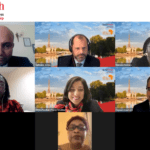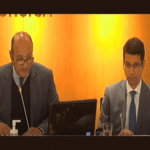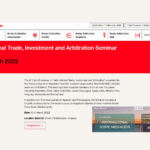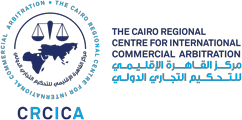
CRCICA at Paris Arbitration Week
Mar 30 2022
Alongside the framework of Paris Arbitration Week, Dr. Ismail Selim remotely participated in a discussion on the Institutional Perspectives and Legal Developments related to Arbitration in Western and Northern Africa in a featured Pane
View Details
Workshop for Matouk Bassiouny & Hennawy Law Firm
May 27 2022
On 27 March 2022, Dr Ismail Selim, Director of the Centre, conducted a workshop at Matouk Bassiouny & Hennawy Law Firm, one of the most prominent Egyptian law firms and regional law practices. Members and associates of Matouk Bassiouny & Hennawy were trained, at the premises of the Law Firm, drafting and negotiating arbitration agreements
View Details
4th World Conference on International Arbitration
Mar 22 2022
On 22-23 March 2022, Dr. Ismail Selim represented CRCICA at the 4th World Conference on International Arbitration on ‘The Role of Arbitration in Achieving a Suitable Environment for Investment’ in conjunction with the Celebration of the 5th Anniversary of the Issuance of Qatar Arbitration Law and the issuance of QICCA’s New Rules for Conciliation and Arbitration.
The Conference was organised by the Qatar International Center for Conciliation and Arbitration (QICCA). Dr. Selim spoke on the second day on the session moderated by Sheikh Dr. Thani Bin Ali Al- Thani, Board Member of QICCA. Dr. Selim focused on the recent developments and future perspectives on the Egyptian Arbitration Law and CRCICA Arbitration.
View Details
Branch Seminar on Impartiality of Arbitrators
Mar 22 2022
On 22 March 2022, the Egypt Branch organized jointly with CRCICA a hybrid seminar on “The Impartiality of Arbitrators”, held at CRCICA (the seat of the Branch). The speaker was Dr. Karim El Chazli, MJur (Oxford), PhD (Sorbonne), Legal advisor at the Swiss Institute of Comparative Law, and the moderator was Prof. Dr. Mohamed Abdel Raouf, Chair of the Egypt Branch, Attorney at law, Partner and Head of the international Arbitration Group at ABDEL RAOUF LAW FIRM.
Dr. El Chazli presented an overview of the main issues he discussed in his PhD dissertation “L'impartialité de l'arbitre” ” published in 2020. He focused on the importance of the impartiality of arbitrators, the distinction between the concepts of impartiality, independence and neutrality, the sanction for the breach of the duty to disclose in light of recent decisions of the Egyptian Court of Cassation ; the circumstances that give rise to risks of partiality and the impartiality of party-appointed arbitrators.
Attendees participated actively in the webinar through interesting questions and comments which focused on the impartiality of party-appointed arbitrators and the prevailing view according to which party-appointed arbitrators and presiding arbitrators should be subjected to the same impartiality standards. 40 participants attended the seminar in person, while 165 participants attended virtually. Participants were from Egypt, Saudi Arabia, Morocco, Lebanon, Yemen, United Arab Emirates, Jordan, Iraq, France, Kuwait, Bahrain, USA, Malaysia, Palestine, Belgium, Sudan, Oman, India, Australia, Qatar, Sweden, and the UK.
To watch the video of the seminar, please click here:
https://www.youtube.com/watch?v=2ouyq_zrdz4&t=1s
View Details
International Trade, Investment and Arbitration
Mar 11 2022
On 11 March 2022, Dr Ismail Selim, Director of CRCICA, on occasion of an International Arbitration Seminar Online, in Uruguay on International Trade, Investment and Arbitration, delivered a speech on the status of International Arbitration in Africa and the Middle-East. The speech also included comments about jurisprudence and arbitral institutional decisions vis-à-vis challenges of arbitrators, advocating for arbitral centres’ jurisdiction and authority to decide on the matter, as permitted by many applicable laws and warranted for others.
View Details
